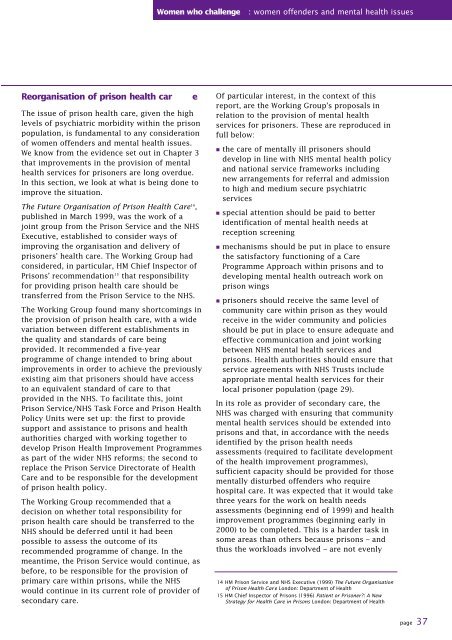Women who challenge - Nacro
Women who challenge - Nacro
Women who challenge - Nacro
- No tags were found...
Create successful ePaper yourself
Turn your PDF publications into a flip-book with our unique Google optimized e-Paper software.
<strong>Women</strong> <strong>who</strong> <strong>challenge</strong>: women offenders and mental health issuesReorganisation of prison health carThe issue of prison health care, given the highlevels of psychiatric morbidity within the prisonpopulation, is fundamental to any considerationof women offenders and mental health issues.We know from the evidence set out in Chapter 3that improvements in the provision of mentalhealth services for prisoners are long overdue.In this section, we look at what is being done toimprove the situation.The Future Organisation of Prison Health Care 14 ,published in March 1999, was the work of ajoint group from the Prison Service and the NHSExecutive, established to consider ways ofimproving the organisation and delivery ofprisoners’ health care. The Working Group hadconsidered, in particular, HM Chief Inspector ofPrisons’ recommendation 15 that responsibilityfor providing prison health care should betransferred from the Prison Service to the NHS.The Working Group found many shortcomings inthe provision of prison health care, with a widevariation between different establishments inthe quality and standards of care beingprovided. It recommended a five-yearprogramme of change intended to bring aboutimprovements in order to achieve the previouslyexisting aim that prisoners should have accessto an equivalent standard of care to thatprovided in the NHS. To facilitate this, jointPrison Service/NHS Task Force and Prison HealthPolicy Units were set up: the first to providesupport and assistance to prisons and healthauthorities charged with working together todevelop Prison Health Improvement Programmesas part of the wider NHS reforms; the second toreplace the Prison Service Directorate of HealthCare and to be responsible for the developmentof prison health policy.The Working Group recommended that adecision on whether total responsibility forprison health care should be transferred to theNHS should be deferred until it had beenpossible to assess the outcome of itsrecommended programme of change. In themeantime, the Prison Service would continue, asbefore, to be responsible for the provision ofprimary care within prisons, while the NHSwould continue in its current role of provider ofsecondary care.eOf particular interest, in the context of thisreport, are the Working Group’s proposals inrelation to the provision of mental healthservices for prisoners. These are reproduced infull below:• the care of mentally ill prisoners shoulddevelop in line with NHS mental health policyand national service frameworks includingnew arrangements for referral and admissionto high and medium secure psychiatricservices• special attention should be paid to betteridentification of mental health needs atreception screening• mechanisms should be put in place to ensurethe satisfactory functioning of a CareProgramme Approach within prisons and todeveloping mental health outreach work onprison wings• prisoners should receive the same level ofcommunity care within prison as they wouldreceive in the wider community and policiesshould be put in place to ensure adequate andeffective communication and joint workingbetween NHS mental health services andprisons. Health authorities should ensure thatservice agreements with NHS Trusts includeappropriate mental health services for theirlocal prisoner population (page 29).In its role as provider of secondary care, theNHS was charged with ensuring that communitymental health services should be extended intoprisons and that, in accordance with the needsidentified by the prison health needsassessments (required to facilitate developmentof the health improvement programmes),sufficient capacity should be provided for thosementally disturbed offenders <strong>who</strong> requirehospital care. It was expected that it would takethree years for the work on health needsassessments (beginning end of 1999) and healthimprovement programmes (beginning early in2000) to be completed. This is a harder task insome areas than others because prisons – andthus the workloads involved – are not evenly14 HM Prison Service and NHS Executive (1999) The Future Organisationof Prison Health Care London: Department of Health15 HM Chief Inspector of Prisons (1996) Patient or Prisoner?: A NewStrategy for Health Care in Prisons London: Department of Healthpage 37
















